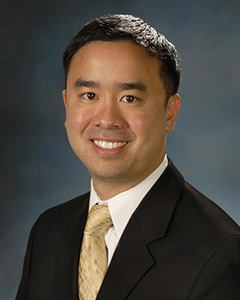June 10, 2020:
 Vu Hong Duong, MD, was recently appointed to represent the University of Maryland Marlene and Stewart Greenebaum Comprehensive Cancer Center (UMGCCC) on the Big Ten Cancer Research Consortium (Big Ten CRC) Steering Committee. Dr. Duong serves as associate professor of medicine at the University of Maryland School of Medicine (UMSOM) and chair of the UMGCCC’s Clinical Research Committee.
Vu Hong Duong, MD, was recently appointed to represent the University of Maryland Marlene and Stewart Greenebaum Comprehensive Cancer Center (UMGCCC) on the Big Ten Cancer Research Consortium (Big Ten CRC) Steering Committee. Dr. Duong serves as associate professor of medicine at the University of Maryland School of Medicine (UMSOM) and chair of the UMGCCC’s Clinical Research Committee.
The Steering Committee is composed of one researcher from each member institution. The Steering Committee meets on a regular basis to review activities of the consortium and decide matters of policy. The Steering Committee determines the criteria for approving concepts for development with the Big Ten CRC.
“It’s a great pleasure and honor to be appointed to the Big Ten CRC Steering Committee and join this esteemed group of physicians and scientists,” Dr Duong said. “The Big Ten CRC allows us to foster some meaningful and productive collaborations, both on the institutional level as well as the individual level, particularly for young faculty members who are looking for other collaborators for their research projects and other young scientists who have similar interests. The consortium is a forum for the exchange of ideas and research, and in particular for expansion of accrual and promotion of investigator-initiated studies.”
The University of Maryland Greenebaum Comprehensive Cancer Center joined the Big Ten CRC in January, rounding out representation from all Big Ten cancer centers.
“Joining the Big Ten CRC allows us to diversify and expand our list of available clinical trials, which ultimately allows greater access to trials for our patients.” Dr. Duong said. “It also helps us accrue for any trials in which we have particular interest and allows us to generate data more rapidly, with the goal of helping the cancer community at large.”
Dr. Duong is board-certified in medical oncology and hematology and is a graduate of the University of Virginia School of Medicine, where he also completed his residency. He completed a fellowship in hematology/oncology at the H. Lee Moffitt Cancer Center, University of South Florida.
Dr. Duong joined the University of Maryland in 2012. His clinical and research expertise is in acute leukemias, myelodysplastic syndromes, and bone marrow failure syndromes. He has contributed to several early-phase investigator-initiated clinical trials and has served as a site principal investigator for industry-supported clinical trials.
“Within myelodysplastic syndromes, I’m particularly interested in looking at novel agents addressing an area of unmet need, for patients with higher-risk disease whose disease has progressed after therapy with the current standard of care,” Dr. Duong said. “In acute myeloid leukemia, my interests are mostly in finding novel combinations and therapeutic agents for patients who have relapsed or are refractory to first-line therapy.”
Dr. Duong serves in a variety of leadership roles within the UMGCCC and the UMSOM, including chair of the cancer center’s clinical research committee, an Institutional Review Board member, medical director for inpatient and outpatient services, and mentor to fellows, residents, and medical students.
UMGCCC is one of 51 National Cancer Institute (NCI)-designated comprehensive cancer centers in the nation, with a strong emphasis on basic, clinical, and translational research. UMGCCC’s comprehensive research programs include the Experimental Therapeutics Program, Hormone Responsive Cancers, Molecular and Structural Biology, Population Science, and Tumor Immunology and Immunotherapy.
“We’re living in a very exciting time as it comes to the treatment of cancer – a time of tremendous progress and understanding of cancer biology and advancing our treatment strategies,” Dr. Duong said. “I’m really looking forward to representing the University of Maryland Greenebaum Comprehensive Cancer Center and being part of the leadership of the Big Ten Cancer Research Consortium and supporting its mission.”
About the Big Ten Cancer Research Consortium: The Big Ten Cancer Research Consortium was created in 2013 to transform the conduct of cancer research through collaborative, hypothesis-driven, highly translational oncology trials that leverage the scientific and clinical expertise of Big Ten universities. The goal of the Big Ten Cancer Research Consortium is to create a unique team-research culture to drive science rapidly from ideas to new approaches to cancer treatment. Within this innovative environment, today’s research leaders collaborate with and mentor the research leaders of tomorrow with the unified goal of improving the lives of all patients with cancer.
About the Big Ten Conference: The Big Ten Conference is an association of world-class universities whose member institutions share a common mission of research, graduate, professional and undergraduate teaching and public service. Founded in 1896, the Big Ten has sustained a comprehensive set of shared practices and policies that enforce the priority of academics in the lives of students competing in intercollegiate athletics and emphasize the values of integrity, fairness and competitiveness. The broad-based programs of the 14 Big Ten institutions will provide over $200 million in direct financial support to more than 9,800 students for more than 11,000 participation opportunities on 350 teams in 42 different sports. The Big Ten sponsors 28 official conference sports, 14 for men and 14 for women, including the addition of men’s ice hockey and men’s and women’s lacrosse since 2013. For more information, visit www.bigten.org.














Subscribe to the Big Ten CRC Newsletter X
X Facebook
Facebook YouTube
YouTube